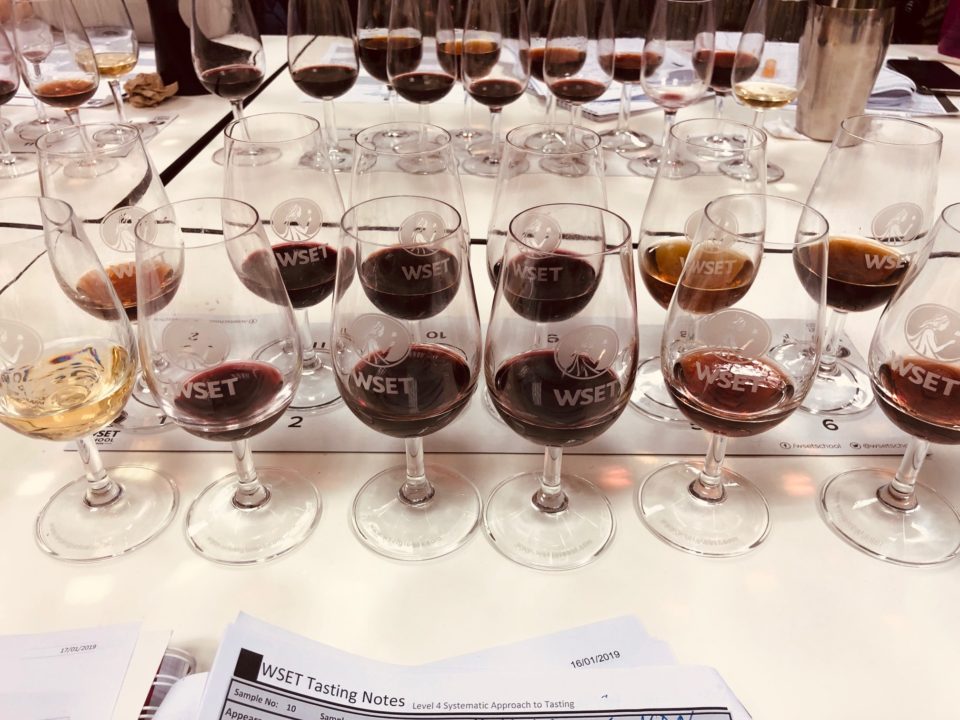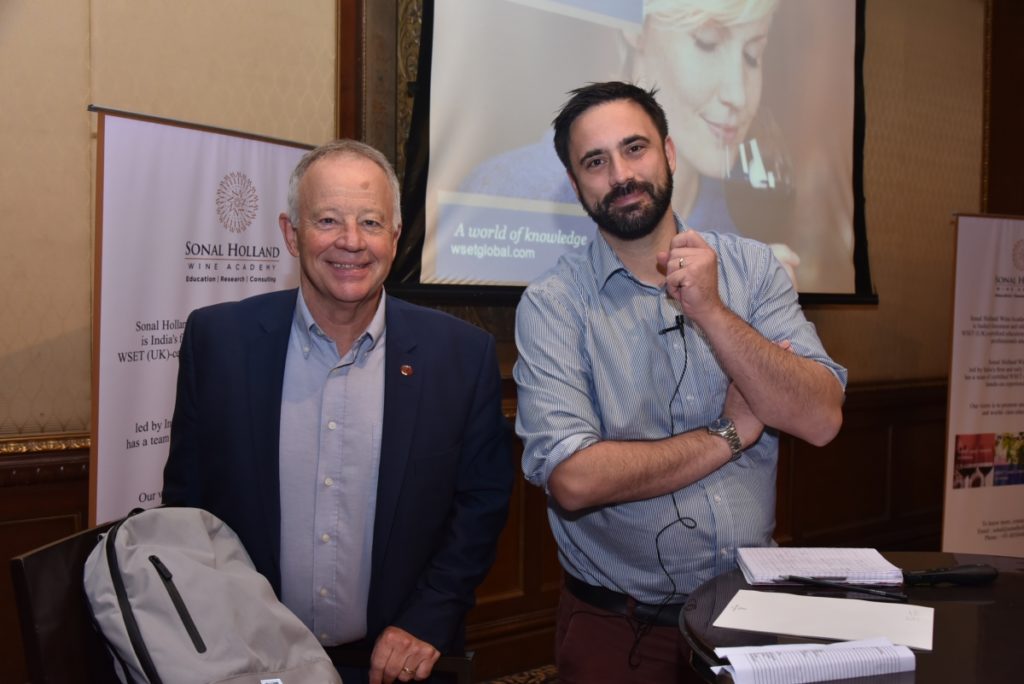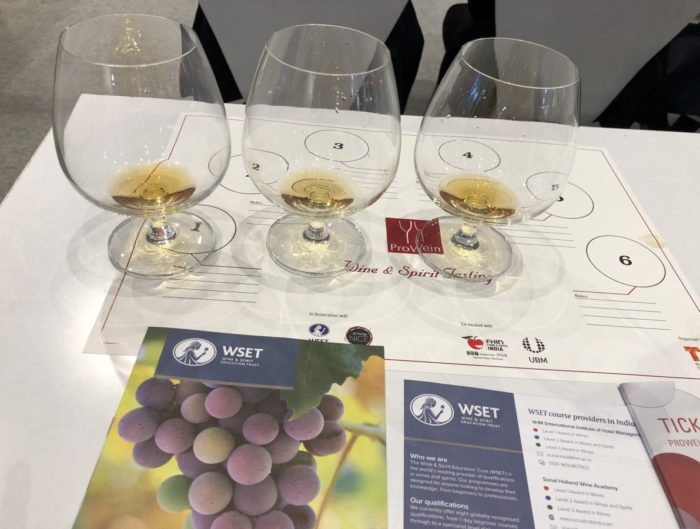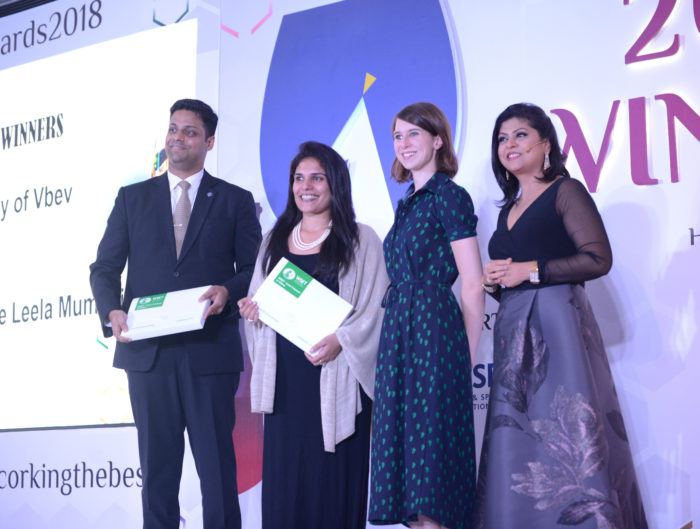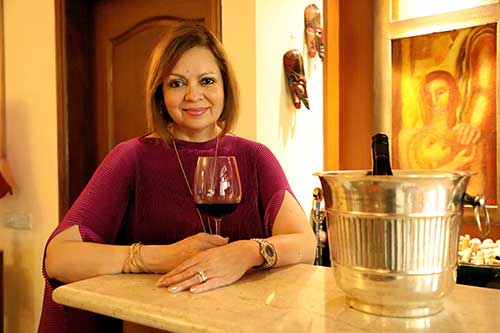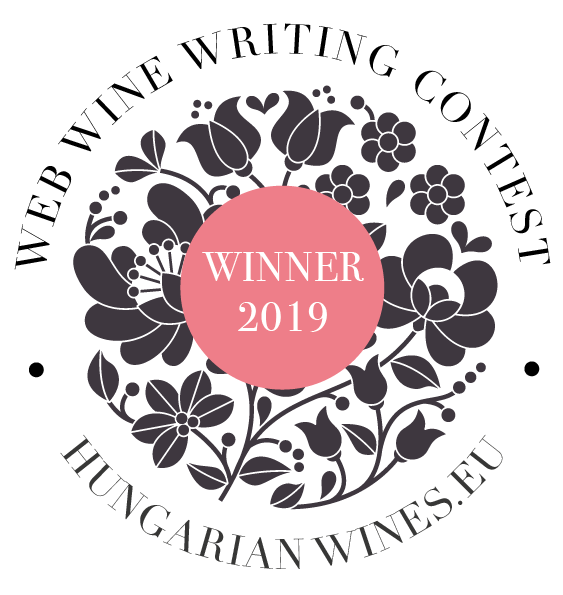What is new with the WSET, the largest wine and spirits school in the world? A major syllabus re-jig and new courses to cater to the rapidly-changing world of alcoholic beverages, says CEO of the WSET, Ian Harris who was in Mumbai for the India Wine Awards a while ago. And yes, India is growing as an education hub…
In its 50th year, the WSET (the Wine & Spirit Education Trust) has released data that states that in 2018-19 a total of 108,557 candidates took a WSET qualification, breaking the 100,000 barrier for the first time.
Here are some more facts:
In its newest syllabus change (from August 2019), the WSET now has 3 separate subject streams – wine, spirits and sake. Spirits, originally clubbed together with wine, now has its own syllabus and qualifications, and is topping the numbers chart with +33% over last year.
So who are these students of wine, spirits and sake? Besides professionals working in the international beverage industry, a slew of interested enthusiasts are also signing up to take courses with the WSET, the global organization which provides wine and spirits education in the world.
In India, despite tough taxes, the interest in wine and spirits is steadily growing against all odds, with APPs (approved providers) offering Levels 1, 2 and 3 of the WSET qualifications. The numbers have been sufficiently interesting to bring Ian Harris, CEO, WSET to India to partner with Sonal Holland MW in her third edition of the India Wine Awards in a series of pre-event masterclasses.
On the sidelines of the excitement of the India Wine Awards, Harris found time to answer some of my questions.
Read to understand what the WSET is offering in India, and why Harris is so pleased with the growing Indian interest in wine.
The WSET has been making significant changes in its curriculum, separating spirits from wine, adding saké and much more. Why did you decide to make these changes at this given point in time? And given the rapid changes happening in the world of wine (new regions, new grapes, changing climate) how often do you anticipate changes in the curriculum in future?

Ian Harris, CEO of the WSET at the India Wine Awards 2019
We took the decision to split the qualification into three product streams – wine, spirits and sake, mainly because we have a lot of people who did our qualifications who were just interested in wine but had to study spirits, even though this might not have been part of their jobs. And also, people who pursue wine aren’t necessarily spirits consumers. So we took the decision that if we were going to teach spirits properly, we needed to have spirits qualifications at every level. We already had Level 1 and Level 2, but when we split the qualification, we took spirits out of the wine qualifications of Levels 2,3 and 4.
We have just launched in the first of the Level 3 qualifications in spirits which includes Asian spirits, like Baiju and Shochu because there is a growing group of people who want to learn about spirits of the world, particularly people who work in bars around the world. We took that decision about a year ago.
We look at our qualifications about every 3 to 4 years, and we would change the syllabus if necessary to reflect the global market and the new wines and spirits coming into the industry.
The WSET has announced a record number of enrollments in its courses in the last calendar year. Do you feel the curriculum changes have contributed in any way to the rise in interest in the WSET qualifications?
When we introduced Level 1 qualifications – we introduced the Level 1 in wine in 2003 and Level 1 in spirits in 2009 – that really opened by WSET qualifications to people who may not have been able to afford the higher qualifications or didn’t need the higher level of knowledge for their jobs. So one of the big drivers of our growth – and last year we had over 100,000 students in 12 months – has been the growth of Level 1 qualifications, which are aimed at people just starting out in the industry or people who just need the basic knowledge of either wines or spirits or sake.
If you had to pinpoint several significant trends in the beverage world you feel of importance to students and watchers of the alcoholic beverage industry, what would you say they were?
I think the most important trend in the beverage world is that people are appreciating that if they spend a little bit more (on education), they’ll be able to open up a whole new world of different wines and indeed, different spirits. The significant trend is that people are more willing to try different products, to experiment, and that is helped very much by people who are working in restaurants as sommeliers or behind the bars as bartenders or mixologists. That trend has been helped by the education of these industry people, and indeed the consumer who is going into those bars and
restaurants. The more knowledge they have, the more they are prepared to
experiment.
The WSET Level 2 in spirits has seen a lot of traction in India. I believe this was your personal baby. How do you explain its popularity here (and other regions where it is popular) and how do you want to develop it further?
That’s an easy question to answer!
I joined the WSET in 2002 and prior to that, I worked for Seagram, a big multinational spirits company which was taken over by Diageo and Pernod Ricard. So I worked for 15 years in the spirits industry at a senior level; I worked in France for 3 years as part of my job working in Cognac, because Seagram owned Martell, so Martell cognac is a particular passion of mine.
When I joined WSET in 2002, the courses being run on spirits were very poor. They were just a part of the wine qualifications, tagged on at the end of those courses. The WSET had already started to look at what they could do to expand education in spirits but when I joined I did give it a kickstart because firstly, I knew a lot about spirits industry and a lot of people in the industry. People often asked me, am I a wine expert, the answer is no, I’m not one but one thing I pride myself on is being an expert in Cognac as I have lived there.
So I drove the agenda for the WSET to develop what is now the Level 2 in spirits in 2003. Because of the success worldwide, we launched the Level 1 in spirits programme in 2009 which was aimed at people with just basic knowledge. Then 2 months ago, we launched the Level 3 qualification. So yes, I pushed the agenda for WSET to have a specific spirits qualification and it has been a great success. The biggest market for it at the moment is America. The big (liquor) distributors in the USA are putting a lot of students through our spirits courses. But I’m delighted it has got so much
traction in India.
What are your views and observations on the response in India to the WSET courses? (Given the ground reality of the Indian wine market, specifically?)
When we started to run WSET courses through providers in India, my view was there would be more interest in spirits courses than wine courses. But what has happened is that there is a growing interest in learning about the wines of the world, and I’ve been really delighted with the growth of the number of students in India doing our courses. India is now in our top 20, so the growth has been pleasantly surprising (Editor: Just to give some perspective, China is #2, after the UK, while Taiwan and the Netherlands are in the top 10).
Of course, one of the issues, not just in India but in other countries too that have a tough tax regime, is that to get samples of wines from outside India is not easy and not cheap. But with our Level 1, there are producers in India that are able to produce wines suitable for teaching Level 1 in India. We do have Level 2 and we have had a handful of people who have done Level 3 as well, so we are looking forward to seeing even further growth from our existing providers and we will be looking towards new providers in other cities in India.
For Indian WSET students, doing the higher courses like the Diploma means a major investment in terms of add-on costs – travel, buying samples, exposure to wines & fortified wines etc, compared to students in the UK & Europe. Do you feel this might be a deterrent going forward, to generate a larger number of enrollments? Would you suggest any options or solutions to those in India considering higher qualifications?

Ian Harris with Alex de Cata , Business development manager, Middle East, Africa and India, WSET
Okay, obviously as you go up the ladder of qualifications they do get more expensive and we do appreciate that the Diploma which is our flagship qualification is particularly expensive, especially if there’s no Diploma centre in India yet. But once the number of Level 3 students grows, there will be a demand for Diploma in India, but we are a long way away from that.
So for the moment, as you have quite rightly said, people have to travel if they want to do a classroom course, either to London or to Hong Kong as there is nowhere really nearby.
My advice would be for those looking at doing the Diploma, (where they either haven’t got enough time or if they’re finding it expensive,) is that we do have distance learning programmes which are run out of London where you have an online educator, but you still obviously have to buy the (wine) samples. My recommendation is to get themselves along to as many wine events as possible – and the India Wine Awards is a classic example
of this. It is a great opportunity for someone who wants to go on to study
more, especially the Diploma, as they will have the opportunity to taste wines and won’t have to go out and spend money buying them themselves.
So my advice is, look at distance learning. You get the same standard of education but it is online rather than in the classroom, and attend as many wine events as you can to get your tasting skills up to scratch.
For the full list of WSET APPs in India, check the WSET website
https://www.wsetglobal.com/where-to-study/
Many thanks to Apurva Gawande for her support.

